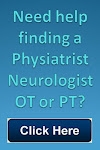Electrical stimulation after stroke is the single most important modality there is for recovery. A modality is...application of something therapeutic like a hot pack or cold gel or...e-stim. Part of the reason e-stim is so important is that it does so many different things.
 |
Drunk smoking guys use e-stim for fun!
|
But here's some funny: Some OTs (occupational therapists) cannot do e-stim clinically. Why? It turns out that in some States OTs have to get a special post-secondary education certification to do it. Which was always weird to me. You know that ad where you can use the stim "ab-exerciser" that’s supposed to give you ripped abs while you lounge around because the e-stim builds muscle? And who’s ordering that? Some drunk guy at 2 in the morning. HE can do it, but OTs can't? Weird.
E-stim does so much that its lack of use clinically for survivors has flummoxed me for years. The reasons given for not doing it clinically tend to be of the "Its too complex to set up" variety. "It’s too expensive." is another thing. Some e-stim machine are expensive. But even the cheap gizmos can do the job. Most of the reason it’s not done is because no one wants to figure out the machine.
 |
Jesse says:
E-stim is not just for
drunk folks and kids! |
Enter my 10 year old son, Jesse. I have a lot of e-stim machines stored in my basement. I've accumulated them over time in various ways. And boys will be boys and boys (and their friends) will go into the basement and put electrodes all over themselves and turn up the stim and see what pops. And they figure the machine out. Because e-stim works like this: Put on the electrodes (they stick to your skin) and turn up the stim. And see what happens. And that’s it.
And yet many clinicians shy away from e-stim. They shy away from something that can do everything from help recovery of sensation, to stretching to building muscle to starting the neuroplastic process. So talk to 'em. And if they have any questions, tell 'em to email me.
Note: There are some serious contraindications to doing estim in some folks. i.e., they can mess up pacemakers and other electronic devices. So always ask your doc first!
 Of course, MDs can be a driving force towards recovery. Each clinician (MD, therapist) has a unique role to play. Some MDs are not very well versed in all things recovery. If you want to find aggressive MDs and therapists, click this link >>>
Of course, MDs can be a driving force towards recovery. Each clinician (MD, therapist) has a unique role to play. Some MDs are not very well versed in all things recovery. If you want to find aggressive MDs and therapists, click this link >>> 




